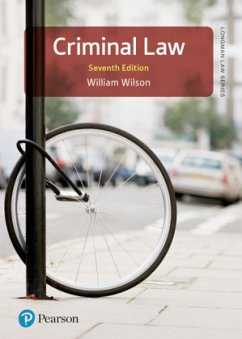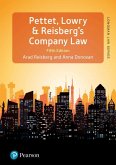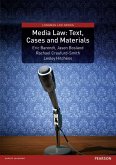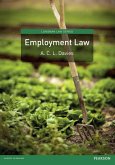Enhance understanding of criminal Law and clarify complex issues
Criminal Law (Longman Law series), 7th Edition, by William Wilson, combines coverage of the core legal principles with discussion of the theories and academic debates that underpin the subject. Enhance your understanding of criminal law and make use of the reading references to pertinent academic articles, hypothetical case examples that clarify complex issues, and end-of-chapter summaries - paving the way for further studies.
New to this edition:
Two cases on consent in the context of non-fatal offences against the person - Melin (2019) qualifies Richardson (1999) on the effect of fraudulent misrepresentation on apparent consent; R v BM (2018) makes an important clarification of the need for non-clinical forms of body alteration to satisfy the public interest if they are to be lawful
In Ivey v Genting (2017), the Supreme Court returned dishonesty to its pre Ghosh (1982) meaning
Mitchell (2018) and Tas (2018), typify the persisting problems governing joint enterprise post Jogee (2016). Tas also raises questions about the continued significance of Rafferty (2007) on supervening acts
Wallace (2018) raises important questions about the notion of a voluntary act in the context of the chain of causation, an issue most notably raised in Kennedy (2007)
Loake v CPS (2017) makes an important clarification of how insanity is a general defence and not limited to crimes of mens rea
Ray (2017) affirms the ruling in Collins (2015) on the question of reasonableness in householder cases, and Cheeseman (2019) rules that the householder defence is available to a person who injures another person who had entered a premises lawfully but had then become a trespasser
William Wilson is Emeritus Professor of Criminal Law at Queen Mary, University of London, and Course Convenor and Chief Examiner for criminal law on the University of London International Laws Programme.
Pearson, the world's learning company.
Hinweis: Dieser Artikel kann nur an eine deutsche Lieferadresse ausgeliefert werden.
Criminal Law (Longman Law series), 7th Edition, by William Wilson, combines coverage of the core legal principles with discussion of the theories and academic debates that underpin the subject. Enhance your understanding of criminal law and make use of the reading references to pertinent academic articles, hypothetical case examples that clarify complex issues, and end-of-chapter summaries - paving the way for further studies.
New to this edition:
Two cases on consent in the context of non-fatal offences against the person - Melin (2019) qualifies Richardson (1999) on the effect of fraudulent misrepresentation on apparent consent; R v BM (2018) makes an important clarification of the need for non-clinical forms of body alteration to satisfy the public interest if they are to be lawful
In Ivey v Genting (2017), the Supreme Court returned dishonesty to its pre Ghosh (1982) meaning
Mitchell (2018) and Tas (2018), typify the persisting problems governing joint enterprise post Jogee (2016). Tas also raises questions about the continued significance of Rafferty (2007) on supervening acts
Wallace (2018) raises important questions about the notion of a voluntary act in the context of the chain of causation, an issue most notably raised in Kennedy (2007)
Loake v CPS (2017) makes an important clarification of how insanity is a general defence and not limited to crimes of mens rea
Ray (2017) affirms the ruling in Collins (2015) on the question of reasonableness in householder cases, and Cheeseman (2019) rules that the householder defence is available to a person who injures another person who had entered a premises lawfully but had then become a trespasser
William Wilson is Emeritus Professor of Criminal Law at Queen Mary, University of London, and Course Convenor and Chief Examiner for criminal law on the University of London International Laws Programme.
Pearson, the world's learning company.
Hinweis: Dieser Artikel kann nur an eine deutsche Lieferadresse ausgeliefert werden.








